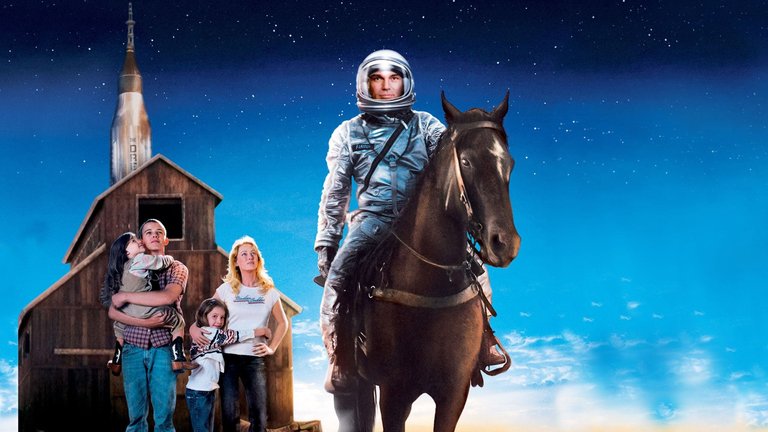Film Review: The Astronaut Farmer (2006)

Impoverished masses all over the world are drawn to America thanks to the notion, heavily propagated by Hollywood, that anyone can rise to greatness, akin to figures like Elon Musk, provided they exert sufficient effort. However, the reality often diverges sharply from this ideal; many successful individuals owe their achievements to affluent backgrounds or influential connections within political, media, military, or intelligence circles. Those lacking such advantages frequently face significant obstacles, a theme subtly woven into the fabric of The Astronaut Farmer, 2006 drama directed by Michael Polish. While the film is structured as a conventional underdog story, its portrayal of ambition and the struggle against systemic barriers takes on a more sombre and disturbing tone when viewed through the lens of today’s society.
The screenplay, crafted by the Polish twins, Michael and Mark, is set in a small Texan farming community. The protagonist, Charles Farmer, portrayed by Billy Bob Thornton, is a former USAF fighter pilot who once trained with NASA as an astronaut. Reluctantly abandoning his aspirations to save his father's ranch, he now leads a seemingly ordinary life with his wife, Audrey (played by Virginia Madsen), and their three children. Beneath this facade, Charles harbours a deep-seated dream of space travel, which he actively pursues by secretly constructing a rocket and space capsule on his property. His quest for rocket fuel draws the attention of the FBI, igniting a media frenzy and presenting a formidable challenge to government officials determined to thwart his ambitions, convinced that space exploration, should be domain reserved for government agencies.
The Polish twins likely sought to create a modern-day fairy tale reminiscent of Field of Dreams, a film that celebrates the pursuit of personal dreams against the backdrop of American history. Visually, The Astronaut Farmer pays homage to the triumphs of the American space programme, drawing inspiration from The Right Stuff. This homage is evident in several surreal scenes that evoke the spirit of exploration and achievement associated with America's past.
Despite its aspirational themes, some critics have dismissed the film's premise as overly far-fetched. Nevertheless, the Polish twins aimed to craft a narrative that resonates with family audiences, evident in the film's PG rating. This positioning as a family-friendly film sets it apart from many contemporary offerings, which often delve into darker or more complex themes.
From a technical standpoint, The Astronaut Farmer is well-executed, but its most significant strength lies in its cast. Billy Bob Thornton relishes the rare opportunity to embody a conventional hero. His performance captures the character's determination and vulnerability, making the character of Charles Farmer a relatable figure for audiences. Virginia Madsen, as Audrey, provides solid support, embodying the role of a devoted spouse who grapples with the implications of her husband's ambitions.
While the film's premise is unconventional, it strives for realism in depicting the challenges faced by an individual attempting to launch a rocket from a farm. The script endeavours to illustrate the complexities and obstacles inherent in such an endeavour. However, as is often the case in Hollywood narratives, this realism is ultimately overshadowed by the need for a conventional happy ending. Despite facing heart-breaking setbacks, Charles Farmer's journey culminates in a triumph, showcasing the enduring spirit of perseverance and the belief that dreams can be realised, even against the odds.
In retrospect, The Astronaut Farmer reflects a specific historical moment, one that may not be replicable in today's Hollywood landscape. Released during George W. Bush's presidency, a time marked by dissatisfaction with the government's handling of the Iraq War, the film's portrayal of government officials as incompetent and oppressive resonated with audiences. The narrative's critique of bureaucratic interference in personal aspirations was more palatable in this context, allowing for a sympathetic portrayal of Charles Farmer's plight.
Today, the dynamics of power and control have shifted significantly. The campaign of intimidation faced by Charles Farmer would likely be more severe and multifaceted in the current climate. Modern financial institutions, intelligence agencies, and social media platforms could conspire to create a living hell for someone like Farmer, portraying him not as a hero but as a potential threat or extremist. If The Astronaut Farmer were produced today, the narrative might invert, casting government officials as protectors of public safety while depicting Farmer as a misguided individual, further complicating the film's moral landscape.
Ultimately, The Astronaut Farmer serves as both a relic of an idealised past and a cautionary tale for the present and future. It encapsulates the enduring allure of the American Dream while simultaneously revealing the darker realities that often accompany such aspirations.
RATING: 6/10 (++)
Blog in Croatian https://draxblog.com
Blog in English https://draxreview.wordpress.com/
InLeo blog https://inleo.io/@drax.leo
Hiveonboard: https://hiveonboard.com?ref=drax
Rising Star game: https://www.risingstargame.com?referrer=drax
1Inch: https://1inch.exchange/#/r/0x83823d8CCB74F828148258BB4457642124b1328e
BTC donations: 1EWxiMiP6iiG9rger3NuUSd6HByaxQWafG
ETH donations: 0xB305F144323b99e6f8b1d66f5D7DE78B498C32A7
BCH donations: qpvxw0jax79lhmvlgcldkzpqanf03r9cjv8y6gtmk9
@tipu curate
Upvoted 👌 (Mana: 30/60) Liquid rewards.